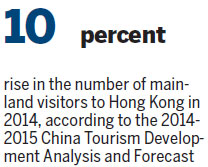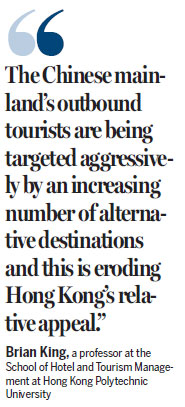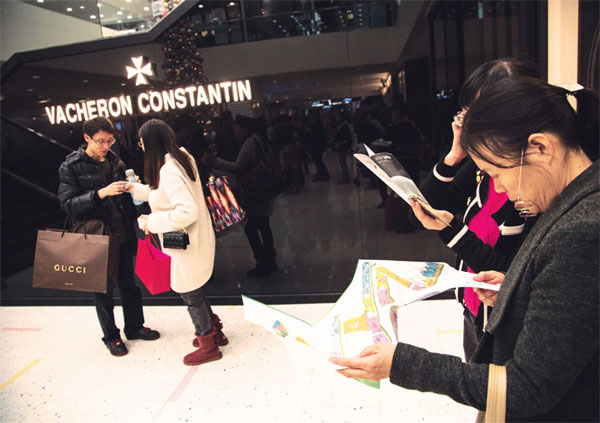HK must do more to make visitors feel at home, says academic
Updated: 2015-01-28 07:26
By Zhou Mo in Shenzhen(HK Edition)
|
|||||||
|
Hong Kong has been urged to diversify its tourism products to strengthen its competitiveness as a popular tourist attraction. Lam Yik-Fei / Bloomberg |
Yin Wanxin, a 26-year-old Beijing dentist, has never been to Hong Kong, and has been longing to see the city on her own.
But her desire has waned lately. "I've heard from my friend that shop assistants in Hong Kong had been rude to her during two of her trips there," Yin said.
She said the attitude of Hong Kong people toward mainland tourists is one of the most important factors in choosing the SAR as a tourism destination, besides safety and timing. Money is not her top concern.
"If I visit Hong Kong, I'll definitely go as an individual traveler, and I can control my expenses," Yin explained.
As mainland people become more affluent, many choose to go to Hong Kong to satisfy their needs in the shopping haven. In 2013, mainland visitors spent a total of HK$170 billion in Hong Kong - roughly six times the amount in 2004, which was about HK$27 billion.

According to Hong Kong's Tourism Commission, mainland visitors remained the primary source of tourists in 2013, with 40.7 million arrivals which accounted for 75 percent of the total number of visitors.
However, a recent report shows that although the number of mainlanders visiting Hong Kong has been rising, the growth rate is slowing down.
According to the 2014-2015 China Tourism Development Analysis and Forecast, the number of mainland visitors to the SAR grew by 16.7 percent in 2013, but fell to 10 percent last year. It predicts that the growth rate in the number of mainland visitors will further decline to 6 percent this year.
Scholars have cited diversified tourism destination options and the unfriendly attitude of Hong Kong people as being among the chief causes of the decline.
"The Chinese mainland's outbound tourists are being targeted aggressively by an increasing number of alternative destinations and this is eroding Hong Kong's relative appeal," said Brian King, a professor at the School of Hotel and Tourism Management at Hong Kong Polytechnic University.
Moreover, he said the social media coverage of the recent "Occupy Central" protests and Hong Kong people's opposition to visitor concentrations have portrayed the city as less welcome to mainland visitors than other destinations.
Song Haiyan, a professor from the same university, shares the same views, saying that with more countries easing visa restrictions on Chinese mainland tourists, they now have a wider choice of destinations.

"The negative attitude of some Hong Kong residents has dented mainland visitors' desire to travel to Hong Kong," Song pointed out.
Besides, the slowdown in the mainland's economic growth has moderated the growth rate in mainland outbound travel.
Many mainland visitors say that Hong Kong's attraction to them is slipping.
"Apart from shopping, there's no other attraction for me," said Xia Qiaolu, an administrative clerk in Guangzhou, who has been to Hong Kong five times.
Gong Juan, a banker from Nanjing, said there are now more shopping channels than before, and some other destinations have better services.
However, tourism industry experts have adopted a positive outlook.
Joseph Tung Yao-chung, executive director of the Travel Industry Council of Hong Kong, said he's confident about the city's ability to attract mainland visitors.
"Transportation from the mainland to Hong Kong is very convenient," he said. "The city is also building more hotel rooms to meet the needs of tourists."
The SAR currently has more than 70,000 hotel rooms, and Tung said an extra 10,000 or more rooms will be available in the next one or two years.
"Accommodation is not a problem for tourists. As long as they book in advance, they'll definitely be able to find hotel accommodation," said Tung.
He admitted that service attitude is one of the key factors affecting mainland people's willingness to visit Hong Kong. "Hong Kong should do more to improve in this respect," Tung said.
King said diversification of tourism products should also be considered. "Slower growth will pressure the industry into providing more innovative and enticing tourism products and experiences that appeal to mainland guests," he added.
sally@chinadailyhk.com
(HK Edition 01/28/2015 page9)
